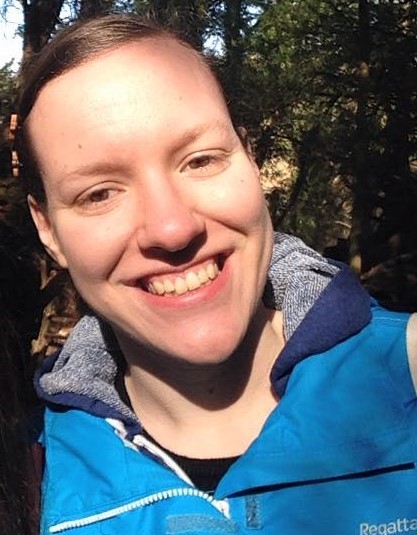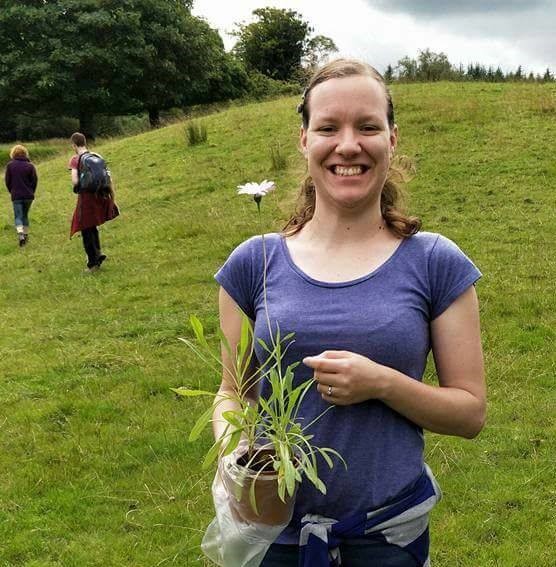 Alice studied a BSc in Conservation Biology and Geography at the University of Exeter in Cornwall. She then went on to undertake an MSc in Earth Science with the Open University. This culminated in an independent research project investigating the impacts of increasing atmospheric carbon dioxide on the carbon and water cycles from tree-ring stable isotope records. She is now a first year PhD student with the Open University in the field of environment and waste management. Her research is looking at trees growing on closed landfill sites. Are they taking in methane, thereby helping to reduce the effects of landfill greenhouse gases on the global carbon cycle? Or are they amplifying the effect by channelling emissions from the waste directly to the atmosphere?
Alice studied a BSc in Conservation Biology and Geography at the University of Exeter in Cornwall. She then went on to undertake an MSc in Earth Science with the Open University. This culminated in an independent research project investigating the impacts of increasing atmospheric carbon dioxide on the carbon and water cycles from tree-ring stable isotope records. She is now a first year PhD student with the Open University in the field of environment and waste management. Her research is looking at trees growing on closed landfill sites. Are they taking in methane, thereby helping to reduce the effects of landfill greenhouse gases on the global carbon cycle? Or are they amplifying the effect by channelling emissions from the waste directly to the atmosphere?
You can catch Alice on her soapbox as part of Soapbox Science Milton Keynes on 29th June, where she will talk about: “Landfill site trees: do they contribute to global warming?”
Follow Alice on Twitter: @AliceFraserMcD1
SS: Alice, how did you get to your current position?
AF-M: After graduating from the University of Exeter in 2014, I wasn’t exactly sure what I wanted to do, but I knew that I had enjoyed the climate change and earth science modules that formed part of my degree. I decided to start a part-time Masters in Earth Science with the Open University. I really enjoyed the final project for my masters degree where I looked at water use efficiency in trees and linked it to the carbon and water cycles. At this point I thought that I had finished with studying! I then got a job in the curriculum management team in the Business School at the Open University. After a few months in the job I realised that I missed the academic side of studying, and wanted a new challenge. I started looking at PhD projects and was put in touch with my supervisor who had an idea about applying current tree research to closed landfill sites. I really liked the applied nature of the idea, and helped to create the project proposal. I started my research in October 2018.
 SS: What, or who, inspired you to get a career in science?
SS: What, or who, inspired you to get a career in science?
AF-M: I am not sure that there is one person or thing that inspired me to study science, as I have always had an interest in the subject. Geography and science were some of my favourite subjects at school and so it seemed like a good idea to go on and study them at university (plus I thought I might get to go on some exciting field trips!). I have had an interest in nature and the outdoors for a long time as my family frequently went on long walks and spent time outside on holidays when I was younger. When I was completing my masters project I realised just how much I enjoyed studying trees and linking the small-scale process to larger ideas like climate change. All of these subjects that I enjoy have come together nicely to form my PhD project.
SS: What is the most fascinating aspect of your research/work?
AF-M: I think my research is interesting because it challenges the idea that trees are always ‘the good guys’ in every scenario. Quite a few people I have spoken to are surprised that trees are likely to be releasing methane to the atmosphere in some environments. It is exciting that I get to be the first person to try to find out whether trees are actually emitting methane from closed landfill sites, or if they are in fact taking it in and helping to mitigate climate change.
SS: What attracted you to Soapbox Science in the first place?
AF-M: I think Soapbox Science is a fantastic way for female researchers to share their work with a much wider audience than they might otherwise be able to do. It is a great chance for researchers to step out of their academic ‘bubble’ and talk to the general public about some really fascinating scientific subjects. The events are a wonderful way of engaging people with scientific research who may not normally encounter scientific principles in their everyday lives, and I am excited to contribute to this. I also think it is a good chance to gain valuable feedback about my research from a wide range of people, from the other participants to the general public.
SS: Sum up in one word your expectations for the day
AF-M: Excited!
I think a lot of people would describe their expectations for the day using this word, but I am really looking forward to talking about my research to the public, and after meeting the other speakers I am really excited to see their talks on the day as well.
SS: What would be your top recommendation to a woman considering studying for a PhD?
AF-M: Try not to be too disheartened if you do not get the first project or PhD you apply for. It is so competitive, but you will get there eventually. Also, get to know as many people as you can! If you can network and meet other people in your subject area, then they are likely to think of you when an opportunity for a project or job arises.
